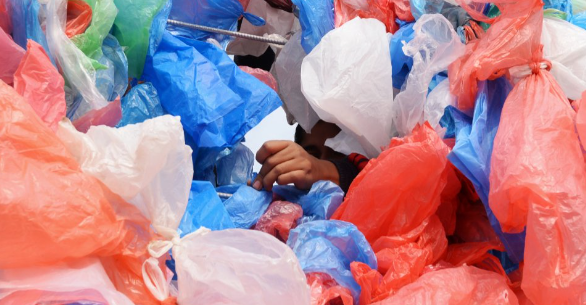Plastic bags ban: Eastleigh traders raise concerns amid NEMA threats of market closures

On Friday, NEMA announced the closure of county markets where traders are using banned plastic bags.
Traders in Eastleigh are urging the government to either allow them to use banned plastic bags or seek more affordable packaging alternatives.
Many traders have reported that customers are reluctant to purchase products wrapped in newspapers due to hygiene.
More To Read
- MPs fault top state agencies over weak accountability, stalled reforms
- Auditor General flags NEMA for relying on a single officer to evaluate thousands of projects
- Court hears how police surveillance systems tracked suspects in Ahmed Rashid murder case
- Residents demand action as borehole drilling company renders Yusuf Haji Avenue impassable
- Counties blamed for garbage crisis as CS Barasa cites rampant defiance
- Safaricom’s Ndoto Zetu initiative elevates maternal health in Kamukunji's Eastleigh with bed donation
"Customers refuse to buy our meals, such as Mandazi or Chapati, wrapped in newspapers, citing concerns about hygiene since newspapers are dirty since they have passed through many hands,” a shop trader told the Eastleigh Voice.
Additionally, some traders claim they cannot afford the authorized khaki bags, known as brown bags.
Patrick Kimani, a fruit vendor along Waudo Street in Eastleigh, Nairobi, said small plastic containers often lead to fruit spillage and are costly, especially when customers prefer larger portions.
"Even though Nema banned the use of plastic bags, they should consider us, the hustlers, who cannot afford expensive containers. They should produce affordable containers and paper bags for us to use when serving our customers," Kimani said.
On Friday, NEMA announced the closure of county markets where traders are using banned plastic bags.
Despite the ban on single-use plastic bags in 2017, the Authority said illegal plastic bags continue to be utilized in various county markets and licensed businesses.
“The Authority has been working with County market managers, where they have been asked to ensure that no one uses the banned bags within their markets but rather use eco-friendly/biodegradable bags. However, Nema Kenya has noted with concern continued use of the illegal bags within various County markets and businesses licensed by counties,” read the notice.
The Authority said it has issued a warning to the Council of Governors alerting them that action will be taken against the use of banned plastic bags.
“It is ironic that market managers cannot allow the sale of banned items such as bhang and other drugs, but are condoning the use of banned plastic bags. NEMA will be taking enforcement action on market managers who condone the use of the banned bags and further close the markets where this crime is committed,” the Authority reiterated.
In 2017, Kenya passed a law banning single-use plastic bags due to environmental pollution.
The plastic bags, according to authorities, clog drainage systems and release toxins once burned.
They also end up in rivers and streams, which degrade into microplastics and cause damage to fish and humans as well.
Since the passage of the law, the authority said there has been visible cleanliness in most towns that previously used to be dotted with plastic carriers bags hanging loosely on buildings and trees.
It noted that 80 per cent compliance with the plastic ban had been recorded.
According to Section 145 (1) of the Environmental Management and Coordination Act (EMCA), when an offence against this Act, is committed by a body corporate, the body corporate and every director or officer of the body corporate who had knowledge of the commission of the offence and who did not exercise due diligence, efficiency and economy to ensure compliance with this Act, shall be guilty of an offence.
In addition, Section 145 (3) adds that the person shall be personally liable for an offence against this Act, whether committed by him on his own account or as an agent or servant of another person.
Top Stories Today













































